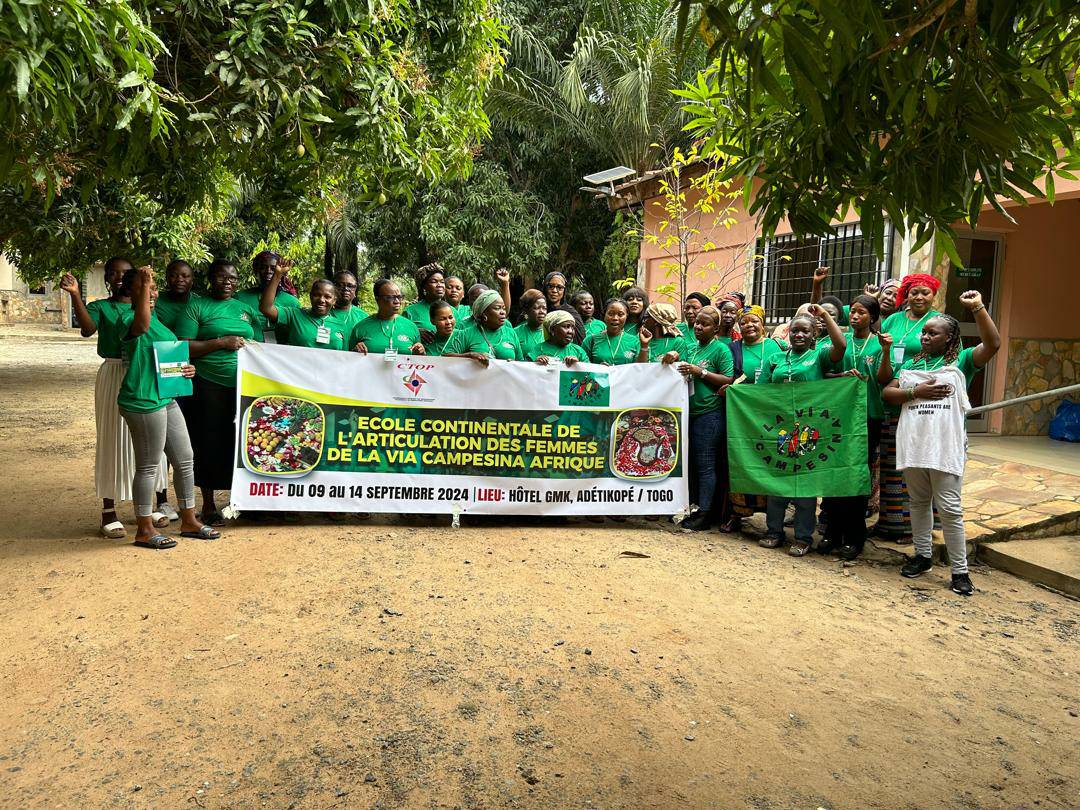The peasant women of La Via Campesina in Africa are saying NO to the WTO and the FTAs
Via Campesina
17th September 2024
Global resistance to free trade intensifies: International day of action against the WTO and free trade agreements
Lome, Togo 13th September,2024: Every 10th of September, the members of La Via Campesina(LVC) around the world unite to resist against World Trade Organisation (WTO) and Free Trade Agreement. These organize actions and conduct awareness campaigns to expose the injustices and inequalities caused by these policies on livelihoods, public health, environment and food sovereignty.
We, the women of La Via Campesina in Africa, gathered here in Lome, Togo; are joining hands with other LVC members, allies and friends of La Via Campesina across the world to raise our voices against WTO and FTAs as they are a threat to human rights, food sovereignty, environmental sustainability and local economies leading to immense inequalities.
The Real Cost of Free Trade
Over the years, the WTO and Free Trade Agreements have prioritized the interests of multinational corporations, often at the expense of us small-scale food producers and indigenous communities. These policies deepen inequality and enable corporations to exploit labor, undermine food sovereignty, and deplete natural resources without any remorse.
The women of La Via Campesina in Africa are saying NO to the WTO and the FTAs, because they do not serve us, they do not protect our rights as women peasants and they do not embrace food sovereignty. Instead, trade agreements developed by WTO are designed to only benefit a few individuals and specifically multinational corporations, while they violate peasants’ rights, degrade the environment, limit access and control of essential social services. The WTO and FTAs have had a profound impact on smallholder farmers by exposing us to increased competition from large agribusinesses and international producers. These agreements encourage the removal of trade barriers, allowing the dumping of heavily subsidized cheap agricultural goods from abroad into our local markets, which we smallholder food producers cannot compete with. As a result, we are driven out of local markets, forced to shift from traditional food crops to export-oriented cash crops, undermining food sovereignty and cultural heritage. Additionally, intellectual property rights tied to FTAs, often give corporations control over seeds, limiting us Peasant’s to access, exchange and develop our traditional varieties, exploiting women and further eroding our autonomy and resilience. This bounds our critical role of seed custodianship as women.
Furthermore, these agreements promote industrial farming models that contribute to environmental degradation and land grabbing, threatening our livelihoods as small-scale food producers. Ultimately, the reduced government protections, such as tariff cuts and the privatization of agricultural services, leave us smallholder farmers vulnerable to price volatility, climate change and displacement from rural areas. This has led to the growing demands for trade justice, calling for policies that prioritize food sovereignty, environmental sustainability, and fair access to markets and resources. We need trade policies that are inclusive and protect our rights as peasants’ farmers.
While proponents of the WTO and FTAs argue that these agreements create opportunities for increased trade and economic growth, small-scale farmers often bear the brunt of the negative consequences. These policies generally favor large-scale agribusinesses and multinational corporations, resulting in the exploitation of labor, loss of food sovereignty, growing inequalities, environmental degradation, and social instability. As a result, there are growing calls for trade justice and the protection of small-scale farmers through policies that prioritize local economies, food sovereignty, and equitable access to resources.
Call to Action
We,
Call upon for fair trade policies that are inclusive and protect our rights as peasants
Call upon African countries to embrace their local agrobiodiversity for food sovereignty.
Call upon various stakeholders to join the campaign and raise awareness about the dangers of WTO and the FTAs.
Call upon African government to promote and strengthen our local markets and protect the rural women peasants
As a global movement, we stand in solidarity amidst the unprecedented climate and economic crises to call for trade agreements that respect human rights, food sovereignty, equality and environmental justice. We advocate for the democratization of trade policies, ensuring that they are developed transparently and with the participation of all affected communities.
We, reject the destructive systems laid out by the WTO and these trade agreements. Instead, we demand a system that prioritizes sustainable development, equitable trade, and respect for nature.
GLOBALIZE THE STRUGGLE!! GLOBALIZE HOPE!






